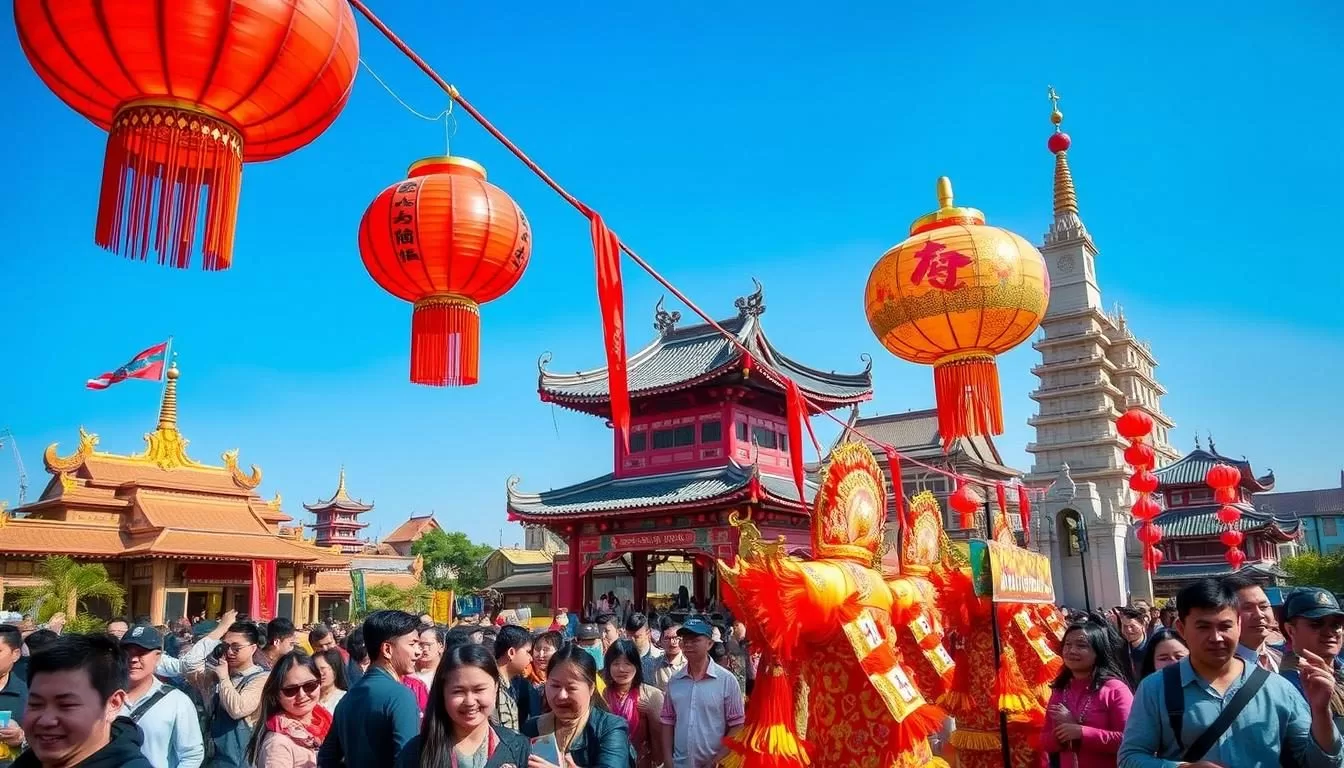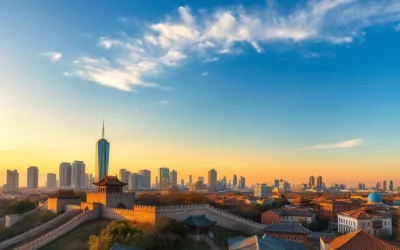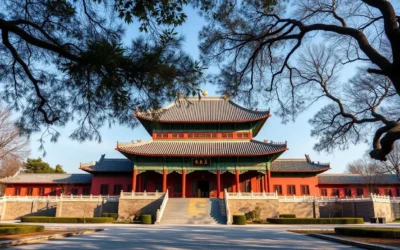✓ Accommodations✓ Flights✓ Rental Cars
Welcome to the heart of Hunan Province, where tradition and culture come alive through its vibrant festivals. These celebrations are deeply rooted in history, offering a unique glimpse into the region’s rich heritage. From lantern-lit nights to lively boat races, each event tells a story that has been passed down through generations.
Many of these festivals are tied to the lunar calendar, making timing an essential part of the experience. For example, the Liling Lantern Festival, held on the 15th day of the first lunar month, showcases thousands of handcrafted lanterns and cultural performances like lion dances. This is just one of the many events that make this region a must-visit for anyone seeking an authentic cultural adventure.
In the coming sections, you’ll discover more about these celebrations, including iconic locations and the festive atmosphere that draws groups from all over. Whether you’re planning a trip or simply curious, these festivals promise unforgettable memories.
Discover the Rich History and Traditions of Hunan Festivals
Step into a world where ancient rituals and vibrant traditions come alive. These celebrations are more than just events; they are a window into the past, offering a glimpse of the culture and values that have shaped communities for generations.
Tracing Ancient Rituals and Ancestral Celebrations
Many of these festivals are rooted in ancient practices that honor ancestors and celebrate communal bonds. For example, the Dragon Boat Festival, celebrated for over 2,000 years, commemorates the poet Qu Yuan, who lived from 340 to 278 BC. This event is a perfect blend of history and tradition, with dragon boat races and zongzi (sticky rice dumplings) being central to the celebration.
Another significant event is the Qingming Festival, observed on April 5. Families gather to pay respects to their ancestors by cleaning graves and offering food. These rituals highlight the enduring importance of family and the deep connection to one’s roots.
How Lunar Calendars Shape Festival Dates
The lunar calendar plays a crucial role in determining festival dates, adding a layer of cultural richness to the celebrations. For instance, the Lantern Festival falls on the 15th day of the first lunar month, marking the end of the Chinese New Year festivities. This event is celebrated with lantern displays, lion dances, and traditional performances.
Similarly, the Mid-Autumn Festival, held on the 15th of the 8th lunar month, coincides with the full moon. Families come together to enjoy mooncakes and appreciate the beauty of the night sky. These festivals not only reflect the region’s culture but also bring people closer, fostering a sense of unity.
| Festival | Lunar Date | Key Traditions |
|---|---|---|
| Lantern Festival | 15th of 1st month | Lantern displays, lion dances |
| Dragon Boat Festival | 5th of 5th month | Dragon boat races, zongzi |
| Mid-Autumn Festival | 15th of 8th month | Mooncakes, family reunions |
Understanding the lunar calendar’s influence helps you plan your visit to coincide with these vibrant celebrations. Whether you’re exploring ancient rituals or enjoying modern festivities, these events offer a unique way to connect with the region’s rich heritage.
Hunan Province, China: Top Festivals to Check Out When Visiting
Festivals in this region are more than just events; they are a celebration of culture, history, and unity. Each celebration offers a unique way to connect with the local way of life, making your trip unforgettable. From colorful parades to ritualistic traditions, these festivals are a must-see for anyone looking to dive into the heart of this country’s heritage.
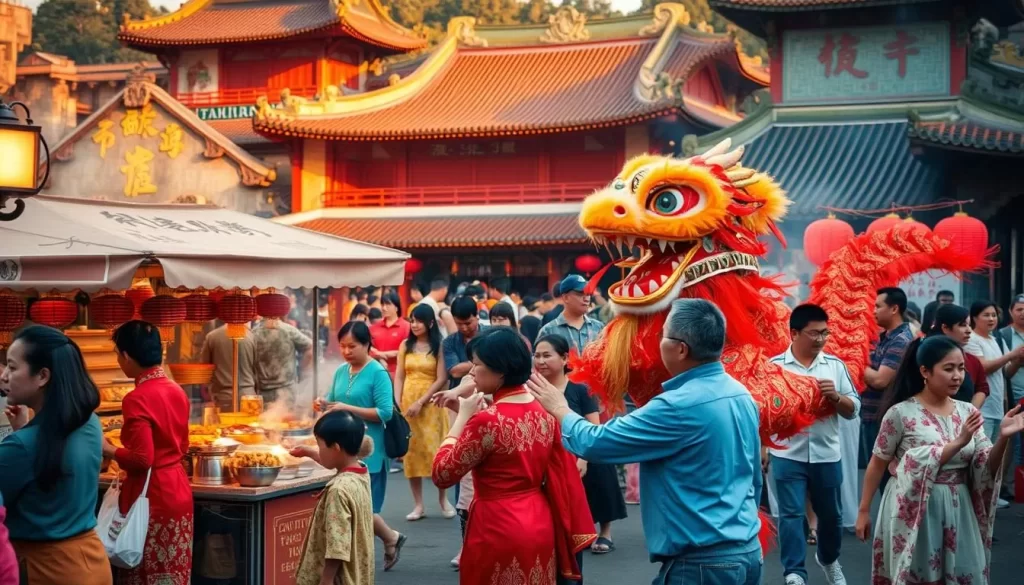
Highlights of Iconic Festivals You Shouldn’t Miss
One of the most iconic events is the Dragon Boat Festival, celebrated on the 5th day of the 5th lunar month. This festival features thrilling boat races and the tradition of eating zongzi, a sticky rice dumpling. Another must-see is the Lantern Festival, held on the 15th day of the first lunar month. Thousands of handcrafted lanterns light up the night, creating a magical atmosphere.
The Mid-Autumn Festival is also a highlight, celebrated on the 15th day of the 8th lunar month. Families gather to enjoy mooncakes and admire the full moon, symbolizing unity and togetherness. These festivals are not just about fun; they are a way to honor traditions that have been passed down for generations.
Connecting With Local Culture Through Time-Honored Traditions
Participating in these festivals allows you to connect with the local culture on a deeper level. For example, during the Qingming Festival, families clean graves and offer food to honor their ancestors. This ritual highlights the importance of family and respect for one’s roots.
Another way to engage is by joining the Ancestral Worshiping Day, a Miao festival held on April 8th each year. This event is a vibrant celebration of the Miao people’s heritage, featuring traditional music, dance, and rituals. By taking part, you become part of a larger group, sharing in the joy and meaning of these traditions.
| Festival | Date | Key Highlights |
|---|---|---|
| Dragon Boat Festival | 5th of 5th lunar month | Boat races, zongzi |
| Lantern Festival | 15th of 1st lunar month | Lantern displays, lion dances |
| Mid-Autumn Festival | 15th of 8th lunar month | Mooncakes, family reunions |
| Ancestral Worshiping Day | April 8th | Traditional music, dance |
These festivals are a perfect way to experience the rich culture of this region. Whether you’re watching a boat race or lighting a lantern, each moment is a chance to create lasting memories. Plan your trip around these events to make the most of your visit.
Vibrant Urban Celebrations in Changsha and Beyond
Changsha is a city where tradition meets modernity in the most vibrant ways. Its urban celebrations are a perfect blend of cultural heritage and contemporary flair. Whether you’re exploring its lively concert scene or iconic landmarks, there’s something for everyone.
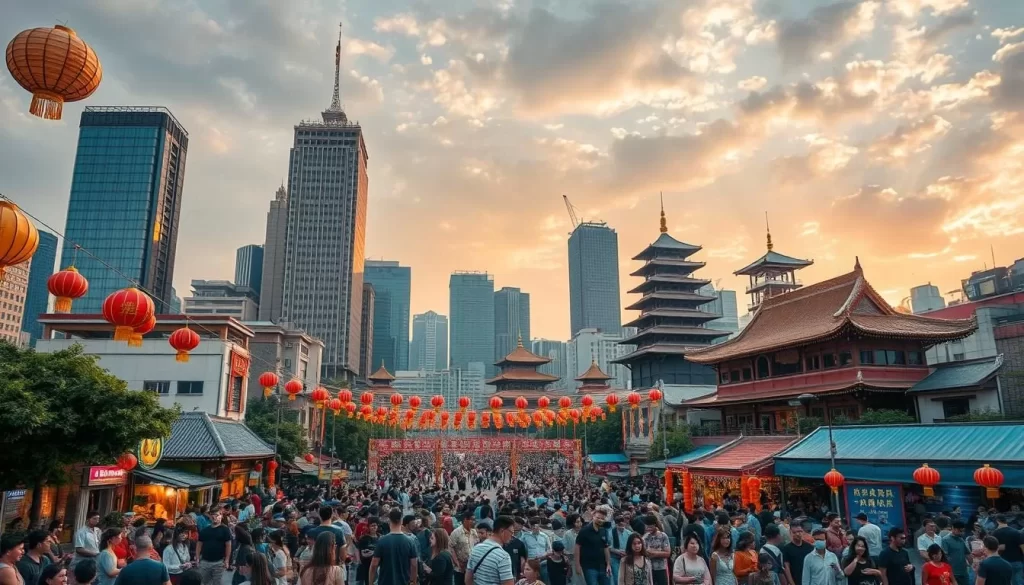
Experiencing the Changsha Concert Scene and Cultural Venues
Changsha’s music scene is thriving, with performances by renowned orchestras and local artists. The city’s concert halls are architectural marvels, offering a stunning backdrop for unforgettable nights. For example, the Meixi Lake International Culture and Art Festival in November showcases performances from both local and international groups.
Cultural venues like the Changsha Concert Hall are hubs for creativity. Here, you can enjoy everything from classical symphonies to modern performances. These events are a great way to connect with the city’s artistic side and meet like-minded people.
Exploring Iconic Landmarks Like Orange Island
Orange Island is a must-visit landmark that offers a glimpse into Changsha’s history and natural beauty. Located in the Xiang River, this island is a peaceful retreat with scenic views and lush greenery. During rainy evenings, the island transforms into a magical spot, perfect for a quiet stroll.
The island also hosts events like the Orange Island Fireworks Festival during the Lunar New Year. This celebration lights up the night sky, creating a breathtaking spectacle for visitors. It’s a perfect example of how Changsha blends tradition with modern celebrations.
| Landmark | Highlights | Best Time to Visit |
|---|---|---|
| Orange Island | Scenic views, fireworks | Lunar New Year |
| Changsha Concert Hall | Music performances | Year-round |
| Meixi Lake | Cultural festivals | November |
Changsha’s urban celebrations are a testament to its rich culture and dynamic spirit. Whether you’re enjoying a concert or exploring iconic landmarks, every moment is a chance to create lasting memories.
Ancient Festivals and Timeless Stories
Dive into the heart of ancient celebrations where stories of loyalty, unity, and tradition come alive. These festivals are more than just events; they are a bridge to the past, connecting communities through shared rituals and legends. From lantern-lit skies to moonlit gatherings, each celebration tells a story that has been cherished for generations.
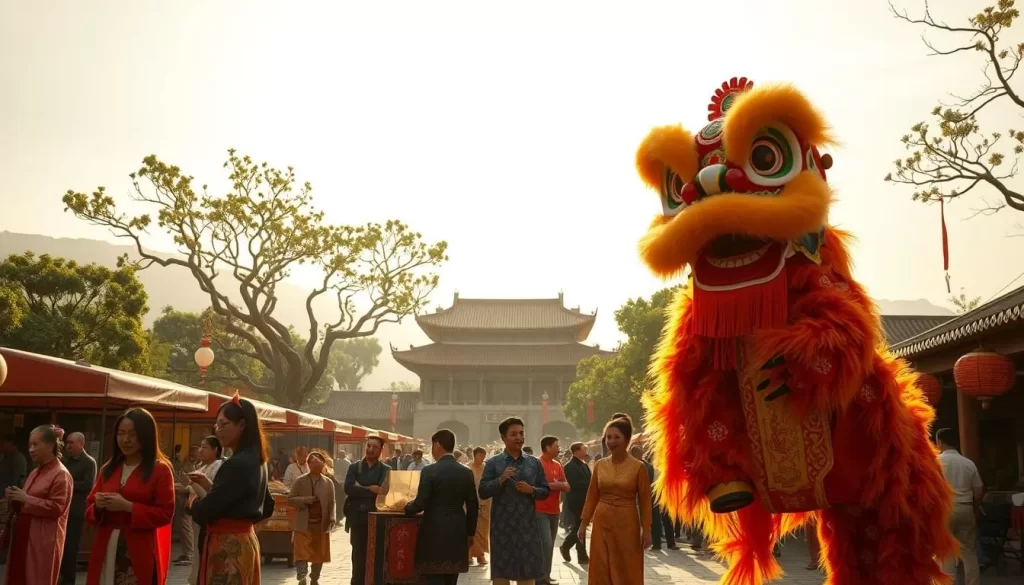
The Lantern Festival and Mooncake Traditions
The Lantern Festival, held on the 15th day of the first lunar month, is a highlight of the year. Thousands of lanterns light up the night, symbolizing hope and renewal. This festival is also known for its cultural performances, including lion dances and traditional music.
Another cherished tradition is the Mid-Autumn Festival, celebrated with mooncakes. These round pastries symbolize unity and togetherness, often shared among family and friends. The festival’s origins date back to ancient times, making it a timeless attraction for those seeking cultural depth.
Legends Behind Tomb Sweeping and Dragon Boat Festivals
Tomb Sweeping Day, or Qingming Festival, is a time to honor ancestors. Families gather to clean graves and offer food, a practice rooted in respect and remembrance. This festival is deeply tied to the story of Jie Zitui, a loyal servant whose sacrifice is commemorated during this time.
The Dragon Boat Festival, celebrated on the 5th day of the 5th lunar month, honors the poet Qu Yuan. Dragon boat races and zongzi (sticky rice dumplings) are central to this event. These traditions highlight the enduring bond between history and community.
| Festival | Date | Key Traditions |
|---|---|---|
| Lantern Festival | 15th of 1st lunar month | Lantern displays, lion dances |
| Mid-Autumn Festival | 15th of 8th lunar month | Mooncakes, family reunions |
| Tomb Sweeping Day | April 4-6 | Grave cleaning, food offerings |
| Dragon Boat Festival | 5th of 5th lunar month | Boat races, zongzi |
“These festivals are not just celebrations; they are a way to honor the past and strengthen the bonds of the present.”
These ancient festivals continue to bring people together, creating a sense of unity and shared identity. Whether you’re lighting a lantern or watching a dragon boat race, each moment is a chance to connect with a rich cultural heritage.
Mouthwatering Food and Festival Feasts
Festivals are incomplete without the flavors that define a culture. In this region, food is more than just sustenance; it’s a celebration of heritage and community. From bustling night markets to elegant hotel buffets, every bite tells a story.
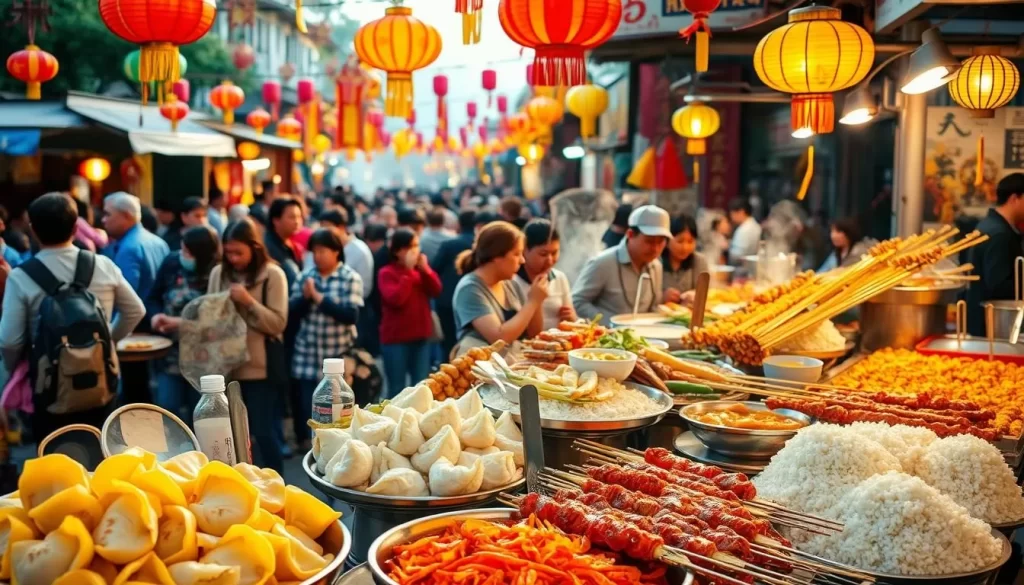
Savoring Local Delicacies and Night Market Flavors
One of the best ways to experience a festival is through its food. Night markets come alive with the aroma of grilled tofu, spicy noodles, and fresh seafood. These markets are a haven for tourists and locals alike, offering a chance to sample regional specialties.
For those who prefer a more refined experience, upscale hotels often host gourmet buffets during festival periods. These meals are a perfect blend of tradition and innovation, featuring dishes like Kung Pao chicken and Mapo tofu.
Communal meals are a cornerstone of these celebrations. Families and groups gather to share dishes that have been passed down through generations. This tradition highlights the importance of togetherness and cultural continuity.
If you’re planning a visit, don’t miss the chance to explore the culinary landscape. From the spicy flavors of Sichuan cuisine to the aromatic dishes of Hunan, there’s something for every palate. For a deeper dive into Chinese culinary traditions, check out this guide to regional cuisines.
Whether you’re sipping tea from a delicate glass or wandering through a vibrant town market, these culinary adventures are sure to leave a lasting impression. Festivals here are not just about the sights and sounds; they’re about the tastes that bring people together.
Seasonal Celebrations: From Day to Night Festivities
Experience the magic of day and night celebrations that light up the region. These events are deeply tied to the lunar calendar, offering a unique blend of tradition and excitement. Whether you’re planning your trip or simply curious, these festivals promise unforgettable memories.
Planning Your Trip Around Lunar Calendar Events
Timing is everything when it comes to experiencing these festivals. The lunar calendar dictates the dates, making it essential to plan ahead. For example, the Lantern Festival falls on the 15th day of the first lunar month, creating a magical atmosphere with thousands of lanterns.
Another highlight is the Dragon Boat Festival, celebrated on the 5th day of the 5th lunar month. This event features thrilling boat races and the tradition of eating zongzi. By aligning your visit with these dates, you can fully immerse yourself in the culture.
Enjoying Dazzling Evening Performances and Parades
As the sun sets, the festivities come alive with dazzling performances and parades. The Lantern Festival, for instance, transforms the night with colorful displays and lion dances. These events are a feast for the senses, offering a blend of tradition and entertainment.
For a unique experience, visit Fenghuang Ancient Town, where the evening ambiance is truly enchanting. The town’s illuminated streets and riverside views create a magical setting for nighttime strolls.
| Festival | Lunar Date | Key Highlights |
|---|---|---|
| Lantern Festival | 15th of 1st month | Lantern displays, lion dances |
| Dragon Boat Festival | 5th of 5th month | Boat races, zongzi |
| Mid-Autumn Festival | 15th of 8th month | Mooncakes, family reunions |
These celebrations are a perfect way to connect with the region’s rich heritage. Whether you’re watching a parade or enjoying a lantern-lit evening, each moment is a chance to create lasting memories.
Insider Tips and Travel Planning for Festival Visits
Planning your visit to these vibrant celebrations requires some insider knowledge. From booking accommodations to navigating transportation, a little preparation ensures a smooth and enjoyable experience. Here’s how you can make the most of your trip.
Booking Accommodations and Navigating Transportation
During peak festival times, accommodations fill up quickly. Consider staying at modern hotels like the Tongguanyao Macrolink Legend Hotel, which offers lavish breakfasts and comfortable facilities. For budget-friendly options, the Zilong Wan Hot Spring Holiday Hotel provides rooms starting at $49 USD.
Transportation can be busy, so plan ahead. Electric trolleys and public buses are efficient ways to get around. If you’re traveling with a group, renting a car might be more convenient.
Cultural Etiquette and Must-Know Festival Rituals
Respect local customs to blend in seamlessly. For example, during the Qingming Festival, it’s customary to clean graves and offer food as a sign of respect. At the Lantern Festival, participate in lantern lighting and enjoy traditional performances.
Understanding these rituals not only enhances your experience but also shows appreciation for the local culture. For more insights, check out this guide to regional traditions.
Practical Advice for Managing Crowds and Timing
Festivals attract large crowds, so timing is key. Arrive early to secure a good spot for parades and performances. The evening is often the busiest, but it’s also when the celebrations are most vibrant.
If you’re visiting during the Dragon Boat Festival, plan to stay for at least a week to fully enjoy the events. Use apps or local guides to navigate crowded areas and find quieter spots to relax.
With these tips, you’ll be well-prepared to immerse yourself in the festivities and create unforgettable memories.
Conclusion
Exploring this region’s vibrant celebrations offers a unique blend of history and modern excitement. From ancient rituals to urban festivities, each event tells a story that connects people across generations. Whether you’re watching lantern displays or enjoying lively parades, these traditions bring communities together.
Planning your visit is easier with practical tips like booking accommodations early and navigating transportation efficiently. High-speed trains and public buses make it simple to explore both cities and rural areas. These insights ensure a smooth and memorable trip for every group.
Don’t miss the chance to experience the rich cultural heritage that makes this place so special. From historical landmarks to modern performances, there’s something for everyone. For more details on these celebrations, check out this guide to lantern festivals.
End your journey with a deeper appreciation for the traditions that shape this world. These festivals are not just events; they’re a way to connect with the heart of a culture. Start planning your adventure today and create memories that will last a lifetime.
The above is subject to change.
Check back often to TRAVEL.COM for the latest travel tips and deals.
